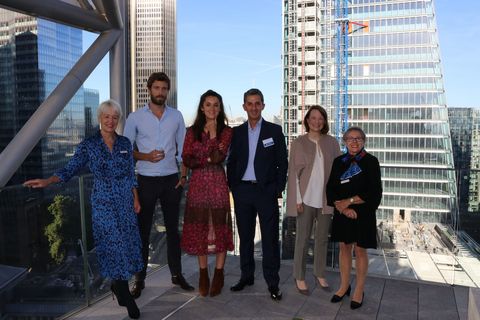The Chamber • Sectors & markets
Champions of e-commerce and social media

The French Chamber welcomed Julien Callède, Co-founder of Made.com and Rosanna Falconer, Co-founder of FasMash for the last Retail Forum session.
Retail Forum - 'Champions of e-commerce and social media' - 26 September 2018
The session was co-chaired by Alain Harfouche, General Manager UK & Ireland at L’Occitane and Catherine Palmer, Legal Administrative Director at Joseph.
E-commerce : Brand, Tech, Innovation & Culture.
The brand of your company is what distinguishes your organization or your product from its competitors in the eyes of the customer. Your main concern is to focus on your product.
You usually have 3 ways to increase your competitiveness:
- to invest in Marketing
- to compete on prices
- to invest on your product.
The marketing option will takes a big part of your budget for a small result.
If you try to compete on prices you will lower your margin and be on competition with bigger corporations as Amazon, and you will not be able to stand for long.
The last option, the best and the cheapest one, is to invest in your product. Indeed, you invest in your product with time, money and creativeness. To gain competitiveness you have to be more original than your competitors.
Another very important thing is the knowledge of who your customers are: their needs, habits...because the first issue can be the lack of data. Data in general gives you a better understanding of who are your customers but communication is also key.
Investments
Investments for young companies can be very low due to budget restrictions.
With the development of the company (the increase amount of consumers, sales and exports...) the initial tech investments can sometimes struggle to follow up the expansion. This could leads to critical points where it can slow the company’s growth. Thereby an early investment in Technology, even for small companies, can be as important as investment in brand’s development.
Innovation
In terms of Innovation, being able to bring something new to the market or being original doesn’t mean companies have to invent something. This is the difference between innovation and invention. Many companies easily confuse these 2 words and focus their resources on the wrong asset.
Culture
In terms of culture, recruiting people with different backgrounds is an asset. People in your teams will have to be able to adapt themselves and not to be scared to fail once and learn from their mistake to restart.
Fashion, Social media & Influencers.
At the end of the 2000’s, Fashion industry started its digital transformation. Rosanna Falconer, Co-founder of FasMash, was on the first stage when it happened. Social media gave a direct access to the consumer in contrast with press, which required a connection between the product and the final customer. Now most of fashion shows are live streamed on social media platforms for more flexibility..
Social media advent was followed by the rise of a new kind of influent people online: the influencers.
The influencers help companies to increase sales of their products. The first mistake usually done is to send a product to influencers without checking the good match between the indivual (influencer) and the product. This has to be the right product for the right person. If the product isn’t appropriate to him/her, this operation will not bring any value for your brand.
Among advices given during the Forum: companies shouldn’t not only focus on macro-influencers (even if they are very well-known), they should also use all the other influencers, the ones who already follow them on social media and who would be more than happy to work with them and represent their products.
Finally, one of the influencers you can’t forget when you think about your brand strategy is your customers.
Promptness & Interaction
The main common point between e-commerce and social media is the instant result and the direct link with the customer.
Interacting with your customers will give you positive and negative feedbacks on your products and as a result, help you improve them if needed or react very quickly (promptness) in case of bad buzz for example.
One final word: trust your customers and make them trust you in return!